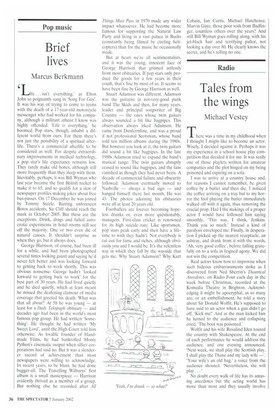Brief lives
Marcus Berkmann
Life . . . isn't everything,' as Elton John so poignantly sang in 'Song For Guy'. It was his way of trying to come to terms with the death of a 17-year-old motorcycle messenger who had worked for his company, although a militant atheist I know was highly offended. 'Life is everything.' he boomed. Pop stars, though, inhabit a different world from ours. For them there's not just the possibility of a spiritual afterlife. There's a commercial afterlife to be considered as well. For despite extraordinary improvements in medical technology, a pop star's life expectancy remains low. They rarely make old bones, although still more frequently than they sleep with them. Inevitably, perhaps, it was Bill Wyman who last year became the first British rocker to make it to 65, and so qualify for a slew of newspaper profiles making jokes about free bus-passes. On 17 December he was joined by Tommy Steele. Barring unforeseen Botox accidents, Sir Cliff should reach the mark in October 2005. But these are the exceptions. Drink, drugs and failed autoerotic experiments in hotel rooms still see off the majority. One or two even die of natural causes. It shouldn't surprise us when they go, but it always does.
George Harrison, of course, had been ill for a while, and had been photographed several times looking gaunt and saying he'd never felt better and was looking forward to getting back to work shortly. This was obvious nonsense: George hadn't 'looked forward to getting back to work' for the best part of 30 years. He had lived quietly and he died quietly, which at least meant he missed the deafening clamour of media coverage that greeted his death. What was that all about? At 58 he was young — at least for a Daily Telegraph obituary — and decades ago had been in the world's most famous pop group. He had written 'Something'. He thought he had written 'My Sweet Lord', until the High Court told him otherwise. As lovable founder of Handmade Films, he had bankrolled Monty Python's cinematic output when sillier corporations had said no. But it was a slenderer record of achievement than most newspapers were willing to acknowledge. In recent years, to be blunt, he had done bugger-all. •The Travelling Wilburys' first album is a small masterpiece — Harrison evidently thrived as a member of a group. But nothing else he recorded after All Things Must Pass in 1970 made any wider impact whatsoever. He had become more famous for supporting the Natural Law Party and living in a vast palace in Bucks (constantly being filmed by circling helicopters) than for the music he occasionally made.
But at heart we're all sentimentalists, and it was the young, innocent face of George Harrison that grinned artlessly from most obituaries. If pop stars only produce the goods for a few years in their youth, that's fine by most of us. It seems to have been fine by George Harrison as well.
Stuart Adamson was different. Adamson was the guitarist in not-very-good punk band The Skids and then, for many years, leader and principal songwriter of Big Country — the ones whose twin guitars always sounded a bit like bagpipes. This observation always irked Adamson. He came from Dunfermline, and was a proud if not professional Scotsman, whose band sold ten million albums during the 1980s. But however you look at it, the twin guitars did sound a bit like bagpipes. In the late 1980s Adamson tried to expand the band's musical range. The twin guitars abruptly ceased to sound like bagpipes, and the fans vanished as though they had never been. A decade of commercial failure and obscurity followed. Adamson eventually moved to Nashville — always a had sign — and hanged himself there last month. He was 43. The photos adorning his obituaries were all at least 20 years old.
Footballers are forever becoming hopeless drunks or, even more questionably, managers. First-class cricket is renowned for its high suicide rate. Like sportsmen, pop stars peak early and then have a lifetime to wish they hadn't. Not everybody is cut out for fame and riches, although obviously you and I would be. It's the relentless way in which they fall by the wayside that gets me. Why Stuart Adamson? Why Kurt Cobain, Ian Curtis, Michael Hutchence, Marvin Gaye, those poor sods from Baffinger, countless others over the years? And still Bill Wyman goes rolling along, with his jet-black hair and terrifying pallor, not looking a day over 80. He clearly knows the secret, and he's telling no one.






















































 Previous page
Previous page